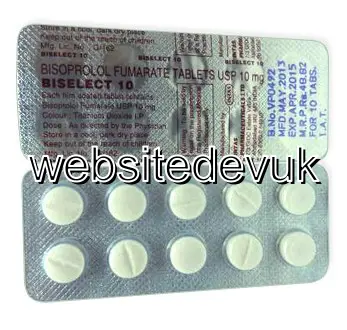| Package | Dosage | Price | Price per Dose | |
|---|---|---|---|---|
| Dosage: 5mg | ||||
| 360 pill | 5mg | £204.17 | £0.57 | |
| 180 pill | 5mg | £112.34 | £0.63 | |
| 120 pill | 5mg | £83.03 | £0.69 | |
| 90 pill | 5mg | £68.38 | £0.76 | |
| 60 pill | 5mg | £50.79 | £0.85 | |
| 30 pill | 5mg | £30.28 | £1.02 | |
| Dosage: 10mg | ||||
| 180 pill | 10mg | £100.61 | £0.56 | |
| 120 pill | 10mg | £74.24 | £0.62 | |
| 90 pill | 10mg | £59.58 | £0.66 | |
| 60 pill | 10mg | £44.93 | £0.74 | |
| 30 pill | 10mg | £26.37 | £0.87 | |

Bisoprolol Description
Overview of Bisoprolol
Bisoprolol is a widely used medication in the treatment of cardiovascular conditions, particularly hypertension and heart rhythm disorders. It belongs to the class of drugs known as beta-blockers, which work by blocking the effects of adrenaline on certain receptors in the body. This action helps to reduce heart rate, decrease the strength of heart contractions, and lower blood pressure. By doing so, bisoprolol alleviates the workload on the heart, making it an essential medication for many patients with cardiovascular issues.
Medical Uses and Effectiveness
Bisoprolol is primarily prescribed for hypertension management. Regular use can significantly lower high blood pressure, reducing the risk of strokes, heart attacks, and other serious health problems. It is also effective in treating heart failure, where it helps improve symptoms and overall heart function over time. Additionally, bisoprolol is used in the prevention of angina pectoris, a condition characterized by chest pain caused by reduced blood flow to the heart. Patients often find that bisoprolol provides stable blood pressure control with a relatively favorable side-effect profile.
How to Take Bisoprolol
This medication is usually taken once daily, with or without food, depending on the prescribing doctor's instructions. It’s important to follow the dosage schedule carefully and not to adjust the dose without medical advice. Consistency is key to achieving optimal results. Patients should not stop taking bisoprolol suddenly, as this can cause rebound hypertension or worsen heart symptoms. Instead, any cessation should be gradual and under the supervision of a healthcare professional.
Potential Side Effects
Like all medications, bisoprolol may cause side effects, although not everyone experiences them. Common adverse effects include fatigue, dizziness, cold extremities, and gastrointestinal discomfort. Some patients might notice a slow heart rate or low blood pressure. In rare cases, allergic reactions such as rash or breathing difficulties can occur. It is essential to report any unusual symptoms to a healthcare provider immediately. Monitoring during the initial phase of treatment helps to ensure safety and effectiveness.
Precautions and Interactions
Patients with certain medical conditions, such as asthma, severe circulatory problems, or certain heart blocks, should inform their healthcare provider before starting bisoprolol. Concomitant use of other medications, like other antihypertensives, antiarrhythmics, or medications affecting heart rate, should be carefully managed to avoid interactions. Alcohol consumption should be limited, as it may enhance the blood-pressure-lowering effects or cause additional side effects. Regular follow-up visits and blood pressure monitoring are vital components of therapy.
Conclusion
Bisoprolol stands out as an effective and well-tolerated beta-blocker for managing various cardiovascular conditions. Its ability to control blood pressure and reduce the strain on the heart makes it an important tool in preventive and therapeutic cardiology. Proper use, adherence to medical advice, and ongoing monitoring can maximize its benefits while minimizing potential risks and side effects.
